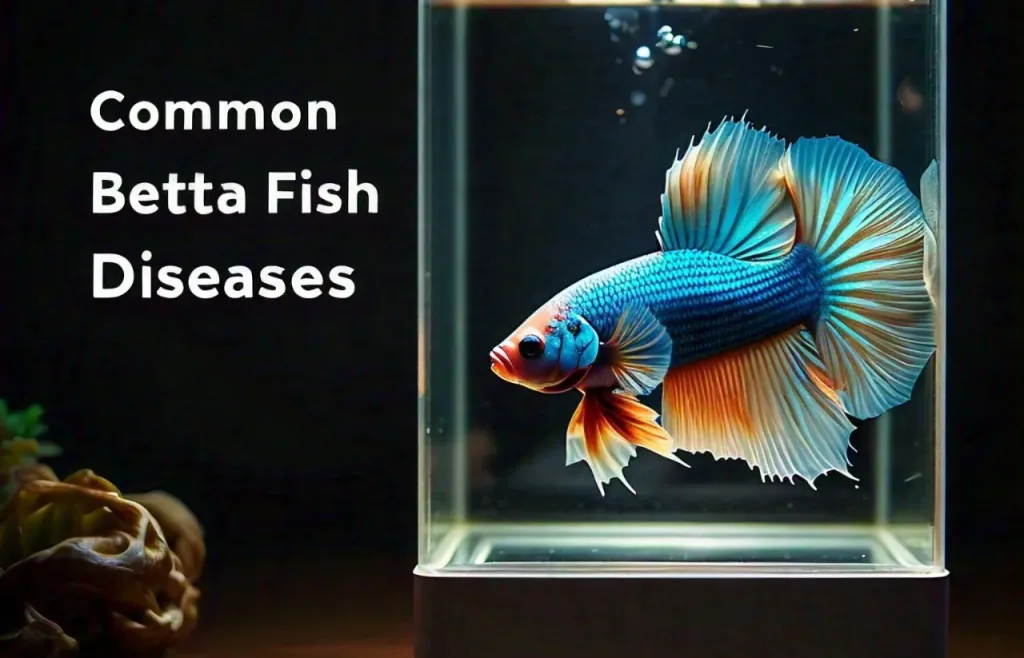Common signs of illness in betta fish include changes in color, clamped fins, lack of energy, or unusual swimming patterns.
The 3 Types of Betta Fish Diseases
Betta fish can get three main diseases: parasitic, bacterial, and fungal.
Parasitic:
- Parasites are tiny organisms that can live on or in your betta, causing symptoms like itching, color loss, or weakness. Ich is a common parasitic disease that appears as white spots on the fish.
Bacterial:
- Bacterial infections can cause open sores, fin rot, or cloudy eyes. These infections spread fast and need quick treatment.
Fungal:
- Fungal infections appear as cotton-like growths on the fish’s skin or fins. They often occur when the fish is stressed or has a weakened immune system.
Keeping the tank clean can help prevent these diseases.
Common Betta Fish Diseases

Columnaris (Cotton Wool or Mouth Fungus):
- A bacterial infection that looks like cotton on the mouth or body.
Dropsy (Pineconing):
- A serious condition where the fish’s body swells and scales stick out like a pinecone.
Fin Rot and Tail Rot:
- Bacterial or fungal infections cause the fins or tail to decay and fall apart.
Ich or Ick:
- A common parasite causing white spots on the fish’s body, fins, and gills
Pop Eye:
- When one or both eyes of the fish bulge out, usually due to an infection.
Eye Cloud:
- The fish’s eyes become cloudy, due to poor water quality or infections.
Fish Fungus:
- White, cottony growths on the skin, gills, or fins caused by fungal infections.
Anchor Worms:
- Tiny worms attach to the fish, causing irritation and visible sores.
What Causes Illness?
Several factors can cause illness in betta fish:
Stress:
- Betta fish can get stressed from things like loud noises, sudden changes in their environment, or too much activity around their tank.
Fighting:
- Bettas are known to fight with other fish, especially males. Injuries from fighting can lead to infections and illness.
Water Temperature & Parameters:
- Betta fish need water that’s just the right temperature and has specific pH levels to stay healthy. If the water is too hot, or too cold, or the pH level is off, it can make them sick.
Diet:
- Feeding your betta the wrong type of food or overfeeding can cause digestive problems and illness.
Injuries:
- Accidents, such as bumping into decorations or sharp objects in the tank, can cause injuries that might get infected.
Taking care of these factors can help keep your betta fish healthy and prevent illness.
FAQs
- How to Treat Betta Fish Illnesses?
To treat betta fish illnesses, start by keeping the water clean and at the right temperature (around 78-80°F). You can add aquarium salt to the water to help with healing. If the symptoms persist, look for a fish medicine designed for your betta’s specific problem, like fin rot or ich. Follow the instructions on the medicine carefully.
- What to Do if You Cannot Treat Your Betta Fish’s Illness?
If you’ve tried everything and your betta is still sick, it’s important to keep it comfortable. Make sure the water is clean and the temperature is right. If the illness is serious and your fish is suffering, it might be best to consult a vet who specializes in fish. They can offer advice on what to do next.
- How Do You Know if Your Betta Fish Is Dead from an Illness?
If your betta fish is lying still at the bottom or floating on its side and isn’t moving, it may have passed away. Check for any movement in its gills or eyes to be sure. If there’s no movement at all, your fish has likely died.
Conclusion
Understanding and preventing illnesses in betta fish is essential for their health and longevity. By maintaining a clean tank, providing the right water conditions, and monitoring your betta’s diet and behavior, you can significantly reduce the risk of diseases like fin rot, ich, or fungal infections. With proper care and attention, your betta can thrive in a healthy, stress-free environment.
